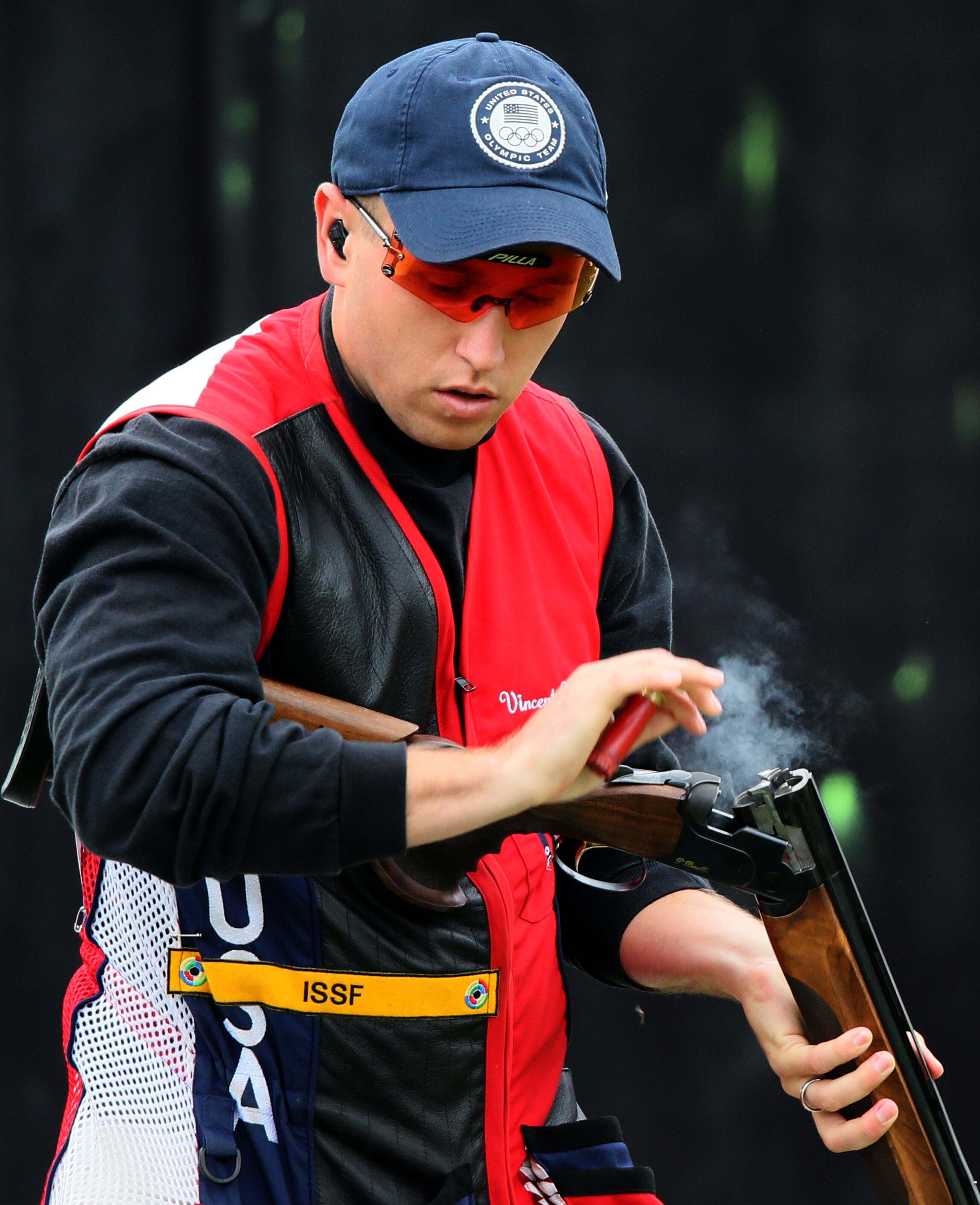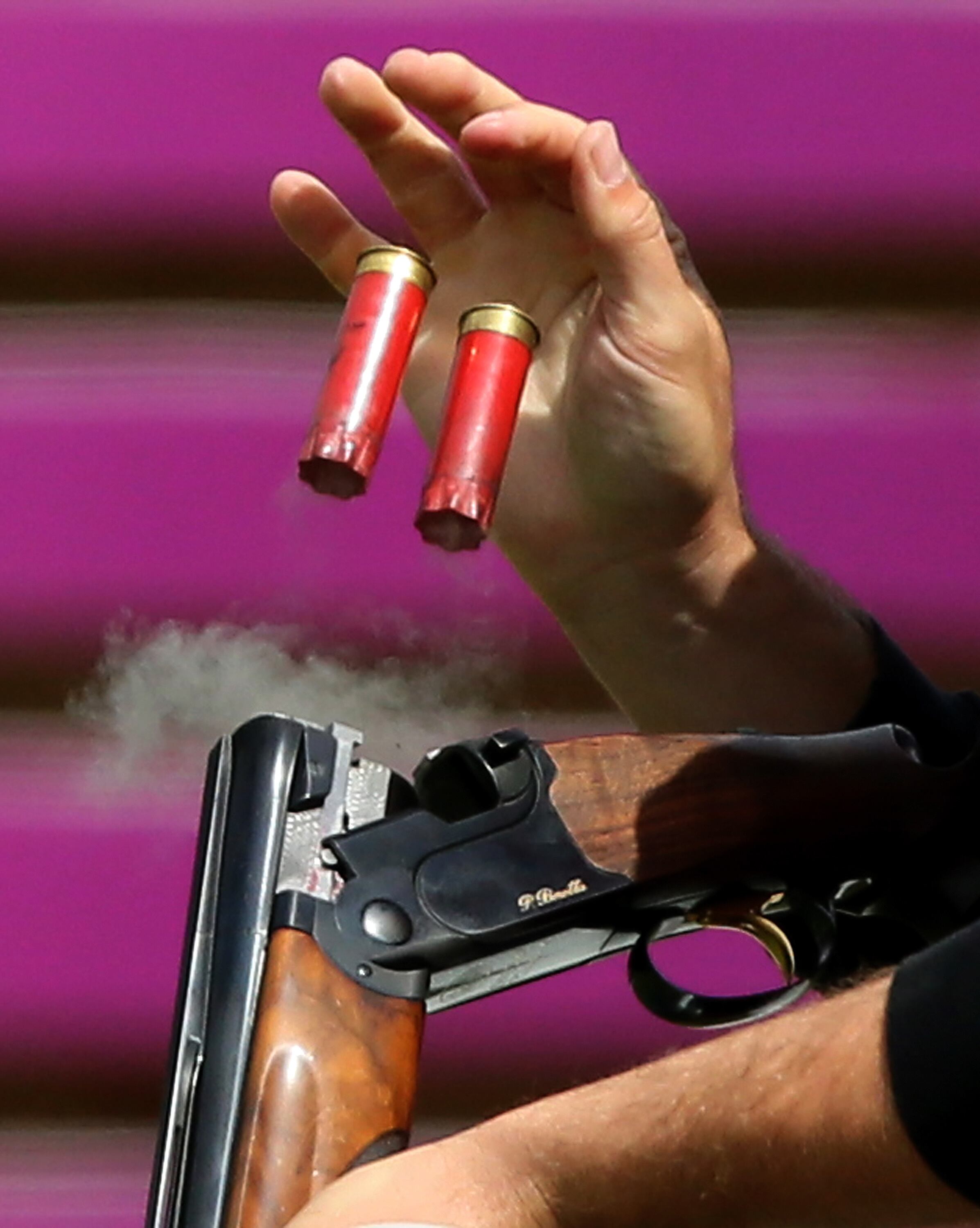This story was originally published at 7:30 a.m. EST on Feb. 27, 2016.
Two-time Olympic gold medalist and world champion skeet shooter Vincent Hancock has a few mind hacks that help him stay on target. Refined during his years in the Army Marksmanship Unit, they might just help you, too.
But the first thing you should know is that it almost didn't happen.
His second Olympic gold medal in 2012, the unprecedented third World Championship title in 2015 last year, and a chance for a third climb up the Olympic podium this year at the Summer Games in Rio de Janeiro — none of it would have happened if Hancock hadn't pulled himself out of a competitive death spiral that had left his shooting in shambles.
"I wanted to quit. I was ready to hang it up, retire and be done," Hancock says.
It was 2011. He had won his first Olympic gold medal three years earlier in Beijing. At first, he remained on top of his game, winning several big matches after the Summer Games.
But then something started to happen. A competitive shooter since he was 11 years old — claiming his first World Cup title when he was just 16 — it was something that had never happened before.
He started to doubt himself.
And for good reason. He was losing.
"After the 2008 Olympics, I rode the high for about two years. I won the World Championships the next year in Beijing. I made every final in 2010, but only won one medal. It kept slowly going downhill and then just bottomed out in 2011."

Hancock lost his laser-sharp focus for a while.
Photo Credit: Marwan Naamani/AFP/Getty Images
The more he practiced, the worse he got. His laser-sharp focus — the kind of focus that enabled him to blast fast-moving clay targets out of the air with remarkable consistency — was getting fuzzy.
He puts it more bluntly: "I was getting really, really bad."
Indeed, at the 2011 World Cup in Slovenia he finished in 69th place.
"I shot awful. Awful. It was the worst I'd ever done."
He called his wife and said he was ready to quit.
Instead, she encouraged him to pray about it. In that quiet reflection he says he found renewed purpose — and was able to start re-honing his focus.
Aiming high
"I had to reboot and restart with the basic fundamentals."
Part of that reset was setting new goals. So, he aimed high.
"I decided my new mission in life was going back to the Olympics and wining another gold medal."
The second part was retraining his brain while recalibrating his training. As soon as he caught himself shooting badly, he would stop and say, "No, this is crap. You have to stay focused the entire time, shooting one round at a time, one target at a time, and just follow the basics. Every time."
He'd boiled those basics down into some simple rules, the mechanics of getting into a good "hold position" — the right stance to begin shooting — and the method he used to see and engage the targets. He'd rehearse those mechanics in his head and then start shooting again.
Usually, it would a take one or two more rounds "and then I'd be back in the zone."
"We try to overthink things and add more things in. But for me, it's two things, that's it — get a good hold point and see that target clearly — and you will break the target. It's as simple as that."
Hancock's return to the fundamentals that worked. Soon he was winning matches again, eventually qualifying for a return to the 2012 Summer Games in London. By the time the shotgun smoke had cleared in the finals, Hancock had shot a perfect round — hitting all 25 of his targets — and was getting another gold medal draped over his neck.
Now he's on his way back.
Hancock has already qualified for one of the two male skeet shooting slots on Team USA's trip to Rio this summer. Frank Thompson, his 2012 teammate, is neck and neck with Spc. Haydon Stewart of the Army Marksmanship Unit, for the second seat.
Although Hancock left the AMU in late 2012, he says he still uses a few key mind hacks refined during his years at the Fort Benning, Georgia-based Olympic incubator that were also critical in reclaiming his competitive focus.

Hancock catches empty cartridges as he competes in the men's skeet qualification at in London on July 30, 2012, for the London 2012 Olympic Games.
Photo Credit: Marwan Naamani/AFP/Getty Images
Train less
OFFduty caught up with Hancock as he was heading to the range for a day of training near his home in Fort Worth, Texas. Between now and the Summer Games in August, he'll be shooting five days a week, with an average of three to four hours at the range, plus another two hours at the gym.
His training regime will be at a higher volume through the beginning of the season, shooting as much 300 rounds a day — or 12 boxes of ammunition — for the first two months, but then tapering down to about half that by the midpoint.
"I find that if I overshoot, I start doing things that I'm not paying attention to," he says. It's more than just fighting off diminishing returns. Even the slightest loss of focus puts him at risk of developing "slightly bad habits. Whereas if I put everything I need to in six or seven boxes, I can actually stay focused and do the right thing every shot."
It's an economy of effort that comes from building consistency.
"I've already got the consistency built in from the last 16 years I've been doing this. So, instead, I just need to keep my mind right. If I can keep my mind in the right place and keep my hands and eyes moving the way they need to with the target, everything works out perfect."
Get distracted
Meanwhile, in the coming months he'll enlist a few helping hands on the range to distract him while shooting.
"Their job will be to do everything they can to get me off my game."
He even calls it "distraction training."
The idea is simple enough. The more your brain gets used to the unexpected while you're shooting, the less you'll get distracted during competition.
"This is something we used to do a lot at the AMU, and it really does help," he says. From random yelling and noises to practical jokes and even whispering in a shooter's ear, just about everything is fair game, short of actually getting in front of a loaded weapon.
"There were several occasions where we had to stop we were laughing so hard," Hancock recalls. "Whoever was on station had to unload, cry it out, wipe their tears of laughter away, and just start over again."
Feel the music
One of his favorite mind hacks is one he's learned to reserve for only real competition.
"I'll find a song that I'll play on repeat over and over again in my head," he says. "I'm not humming or singing it in my voice, it's the exact voice of the actual song. It's just like I'm listening to it on my radio."
It's about giving his conscious mind something to focus on so his subconscious can do the heavy lifting.

Hancock says music plays a special role when he is computing.
Photo Credit: Harry How/Getty Images
"The conscious mind can only do one thing at a time. But the subconscious mind can think of an innumerable amount of things," he says. "So, I have the song going through my head and I let my mind kind of blank out as best as I possibly can and let my training take over."
Every song has a shelf life, though. "You run the risk of getting sick of it if you do it too much."
So he only uses one or two songs for every few competitions and never during training. Then before those songs get stale, he puts together another super short playlist.
The song can be of any genre, but it has to have just the right beat.
"It has to have a particular rhythm to it, one that matches my pace," he says. "The time it takes from when I step on the station, grab my shells, to put my shells in my gun, and then close my gun, get myself set up, move my feet a little bit, find my hold point, move my eyes back, and then get ready to call for the target, it's all in a progression and the song has to fit with the rhythm and pace of that time span."
For the last Olympics, his two songs were "Payphone" by Maroon Five for the first day of competition, and "Feels so Close" by Calvin Harris for the next.
Hancock says the song has also helped channel his amped-up energy during competition.
"You can use that extra adrenaline that the nervousness is giving you. The song hones and slows everything else down. So the targets actually appear slower. They appear closer. They appear clearer. And your movement is that much faster. You can lock on the target. Hold the target to see it perfectly, pull the trigger, watch it break, and if you have a second target, transition over to that. It's pretty amazing, but if we try to consciously do all that, we tend to just get in our own way."





